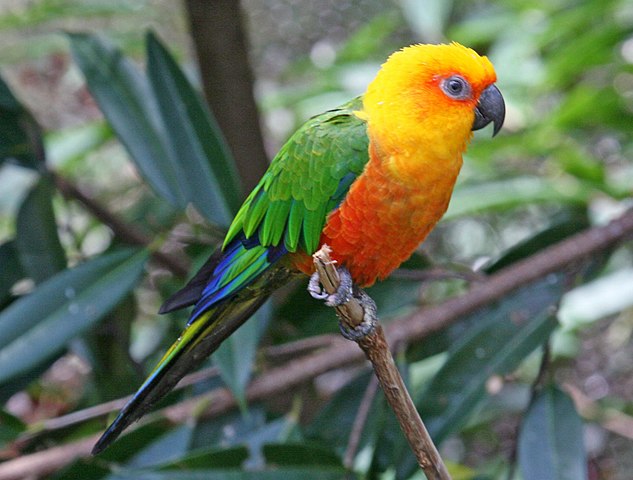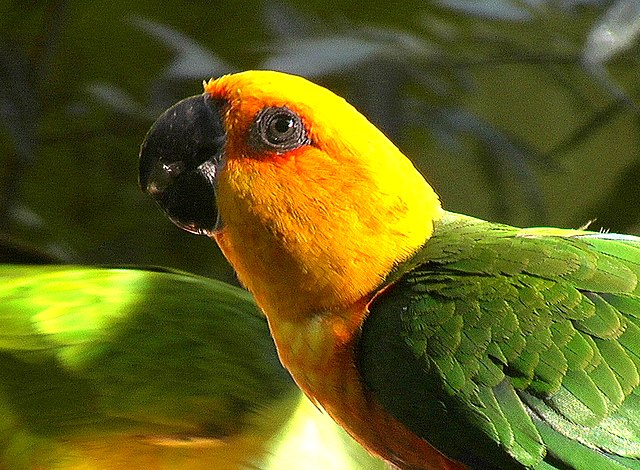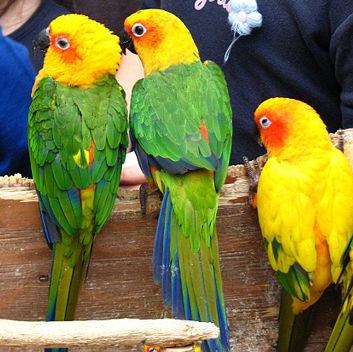Aratinga jandaya, Jenday Conure, is also known as the Jendaya Conure or the Yellow-Headed Conure. It is native to northeastern Brazil and is one of the most popular companion parrots of the Aratinga species. Jenday Conures reach about 12 inches in length and are covered with a rainbow of plumage. The head and upper breast are a bright yellow. This bright yellow blends into a red hue on the lower underside.

A Jenday Conure’s wings, upper tail, and upper back are green and they transition to an orangey red on their lower back. The underside of the tail is black and the underside of the wings is also orangey red. The tip of the tail and the outer wing feathers are blue. The beak and the feet are black. Around two years of age, a Jenday conure will be fully mature. This means their plumage will be brighter as well they’ll have the ability to breed. Surgical sexing is required to determine gender. Both in the wild and in captivity, the Jenday Conure will breed easily. The hen typically lays three to four eggs which hatch after about 26 days.
Jenday Conures are known to have wonderful personalities. They are known to be incredibly affectionate often enjoying a good snuggle or pet from their owners. They’re also known to be very smart. They love to talk and can learn a number of words and household sounds. They can also learn a number of tricks. Properly trained and socialized Jenday Conures are excellent pets for a single owner or for a family with children and pets. The Jenday conure is known to be both tame and extremely hardy which means with proper care, owners will have very little behavior or medical problems.
In the wild Jenday Conures eat fruits, green leafy matter, and seeds. In captivity, they thrive on a pellet-based diet supplemented with fresh fruits and vegetables. They love to play, climb and chew. The tendency to chew can cause a bit of household destruction however providing them with toys and directing their chewing habit to more appropriate items works well for most owners.

In the wild they live in pairs or small groups, communicating with each other in the morning and in the evening with loud chirps and chattering. In captivity, a Jenday will bring this behavior into the home, which means a noisy hello and goodnight each and every day.
Proper caging is important for a healthy Jenday Conure. They live to be about 20 years old in captivity and the larger the cage, the better those 20 years will be. Minimum cage requirements are 24″ W x 24″ D x 30″ H, with metal bars spaced no more than 1/2″ apart. The best material for a Conure cage is stainless steel.
An optimal cage environment will contain clean food and water bowls, and a pull-out tray beneath wire mesh to keep waste and food separate. Several perches of differing sizes and materials for optimal foot health. Climbing branches and toys will keep a Jenday busy when the owner is gone. Here you can find more information on Caring for a Jenday Conure. When the owner is home, a Jenday Conure is tame and social enough to be left out of the cage to interact with their family. This out-of-the-cage time is important to the health and happiness of a Jenday Conure. Confined to a cage and not allowed to interact with their family Jenday Conure will become very unhappy and behavior problems are certain to arise.
The Jenday Conure is one of the tamest, most lovable, and most intelligent companion birds. When properly cared for they will live a long and happy life with their family. The Jenday Conure is a bright rainbow of both color and personality. They’re known to be one of the more affectionate Conures. Their affection makes them second in popularity as companion parrots to the Sun Conure. In fact, many Jenday owners say that their birds are downright cuddly.
The Jenday Conure Parrot, native to Northeastern Brazil, is also known as the Jendaya Parakeet. A veritable rainbow of colors, it starts with yellow on their heads which turns various shades of green along its body to the tip of the tail. A Jenday Conure’s underbelly is covered with crimson and orange feathers covering its abdomen. Tinges of blue frame the feathers on the bottom of their wings.
The Jenday Conure Parrot is generally a loud and chatty conure that will often screech for attention or for his own enjoyment. If you live in an apartment or a community where walls are shared, this may not be the best bird choice for you. You can however train your conure jenday to scream less through trick training.
However, the Jenday Conure is an intelligent bird and is easily trained if they’re properly socialized and handled by an owner who has taken the time to build a bond of trust. The Jenday Conure is normally a very calm parrot. This isn’t to say that they don’t bite; any bird will bite under the proper circumstances. They are however more tame than many and can often spend large amounts of time outside of their cage with great ease.
Outside of the cage or inside, the Jenday Conure enjoys playing with its owner and with a variety of toys. You will often find a Jenday Conure jumping through hoops or hopping from perch to perch inside their cage. Capable of entertaining themselves, you may find a Jenday hanging from their cage bars and climbing around their cage. Perches should be at least 9″ long and ½” in diameter; a variety of perch sizes to exercise feet and help prevent arthritis is recommended.
The Jenday Conure Parrot, like many Conures, is a very active bird and needs exercise time outside of their cage. They need to spend time outside of their cage hanging out, cuddling, and playing with their owners. If you are unable to spend a few hours every day interacting with your bird outside of its cage, then the Jenday Conure may not be the right bird for you.
The Jenday Conure is often considered a good family bird because it can deal with the loud sounds and sudden movements that children often make. Additionally, because they are good-natured and tame, owners generally don’t have to worry about injuries to children. However, owners will be smart to keep close attention on interactions with children to prevent injuries to your Jenday.
Growing to a length of 10 to 12 inches the Jenday Conure will live its full life expectancy, 20 years, with proper care and feeding. In captivity, a Jenday Conure will thrive on a pellet-based diet and daily fresh fruits and vegetables.
Proper cage size for a Jenday is imperative. They need plenty of space to move around and play while you’re away. Too small a cage and you’re asking for trouble. It’s like you being trapped in a closet. You can find more information on caring for a Jenday Conure with this link. Sure you’re protected from the elements but you can’t really move around and the boredom will drive you insane. The result of too small a cage for your Jenday will be aggression, screaming, and possibly pulling out their beautiful feathers.
A cage approximately 24″ W x 24″ D x 30″ H, with metal bars spaced no more than 1/2″ apart, will make a good home for your Jenday. With any bird, it is best to provide the largest cage possible. In fact, if you can provide your Jenday a flight cage, you’ll have a very happy bird. Due to their popularity, the Jenday is readily available at pet stores and breeders and is a relatively affordable parrot to purchase and maintain.

How to Raise a Happy, Healthy Jenday Conure
The best way to have a happy and healthy Jenday Conure is to take wonderful care of them. Proper caging, feeding, grooming, and even training all play an important role in the health and development of your Jenday.
Here’s a list of some of the things you’ll need to begin your role as the proud owner of a Jenday Conure:
- Cage and cage cover
- Play gym
- Cage paper or substrate
- Variety of perches
- Pellets
- Variety of toys
- Nail clippers and styptic gel
- Treats
- Food and water dishes
- The training video, book, or DVD
Let’s take a look at some of these in detail.
Jenday Conure Cages
Your Jenday Conure’s cage is where they’ll spend a significant amount of time each day and night. It is important to make sure the cage is not only made out of safe and durable material, but it is also imperative to have a cage large enough to accommodate your Jenday and to position the cage in a location that provides them with sunlight, camaraderie, safety, and security.
While the largest cage you can manage is optimal, the minimum cage size for a Jenday Conure is 24″ W x 24″ D x 30″ H, with metal bars spaced no more than ½ inch apart. The best cage material is stainless steel, hands down. It is also the most expensive. Stainless steel is durable, rust-proof, safe, and will last the life of your bird.
A secondary option, if stainless isn’t in your budget, is a steel cage treated with non-toxic paint. The paint helps keep the metal in good condition. It is extremely important to make sure the paint is chip-proof and non-toxic. The last thing your Jenday wants to eat is paint, yet you can be certain they will break the cage bars.
Cages with wheels are helpful if you plan on moving the cage from time to time. Cages with a metal grate positioned above a removable tray are also optimal for cleaning. Cage covers help with nighttime sleeping as a Jenday requires 10-12 hours of quality restful sleep each night.
Jenday Conure Food
Pellets are an important part of your Jenday diet. Some owners feed their birds a diet based on seeds and nuts. This is a good way to kill your bird. Sorry, it’s true. Seeds and nuts have a high fat content. Too much fat and your Jenday will be susceptible to fatty liver disease, a weakened immune system, cancer, and more. Save the seeds and nuts for treats. Instead, feed your bird a diet based on organic pellets. Organic will ensure they’re free of pesticides, a common cause of illness in birds. Also, seek to provide pellets to your Jenday that are free of added colors and sugars.
In addition to pellets, your bird will flourish with regular fresh fruits and vegetables. Offer vegetables and fruits in a variety of shapes, textures, and even preparation. Fruits and veggies can be cubed, julienne, pureed, cooked, raw, etc… Variety keeps your Jenday interested in eating healthy. Of course, it’s important to offer a variety of fruits and veggies too. Your Jenday will most likely find favorites, however, it is important to offer all colored vegetables to ensure proper nutrition. The only veggie you don’t want to offer is avocado, it is toxic.
Water Your Jenday
Water is also a necessity for life. Fresh water is important to your Jenday. The absolute best water you can offer is filtered nonchlorinated water. Chlorine isn’t good for your bird. Jenday Conures are excellent companion birds for any family who has the time to take proper care of them. Proper care includes both the basics of caging and feeding as well as training and simply spending time with your Jenday each and every day.
They’re social birds who thrive on social interaction. Trick Training is a positive way to provide great interaction on a daily basis. Take care of your Jenday and they will live a long and virtually problem-free life with you and your family.
The Good & The Bad
Jenday Conures are fantastic, fun, and fabulous birds. With proper care, socialization, and training medical and behavior problems are infrequent. However, occasionally a situation can arise where your bird becomes ill, or ill-behaved. Both can be stressful and heartbreaking for both you and your Jenday Conure.
The good news is, the majority of the time behavior and illness can be prevented or eliminated. Let’s take a look at some of the common issues owners of Jenday Conures deal with
Jenday Conure Medical issues
- Chlamydiosis. Signs of Chlamydiosis are loss of appetite loss, fluffed feathers, and nasal discharge. If you recognize any of these symptoms in your Jenday Conure, take them to your avian veterinarian immediately.
- Diarrhea. Signs of diarrhea are generally a loose stool. It can be caused by a change in your Jenday’s diet to internal parasites. A proper diet is essential to preventing diarrhea. If it occurs, take your Jenday to your avian veterinarian and reduce their fruit intake.
- Polyoma Virus. This virus is deadly. Symptoms are loss of appetite, sudden weight loss, lethargy, and sudden death. If your Jenday begins to lose weight rapidly it is imperative you take them immediately to the avian veterinarian.
- The only way to determine sudden weight loss is to weigh your bird daily and track their weight. This practice will ensure your ability to stay on top of your Jenday’s health and will quite possibly save your life.
- Feather Plucking. This behavior occurs both with illness and environmental or behavioral causes. Before you address the behavior causes, it is important to rule out any medical issues with a checkup at your avian veterinarian.
Jenday Conure Behavior Issues
Any behavior problem whether it is biting, screaming, or feather plucking most often is a result of something lacking in your Jenday Conure’s environment. This means they’re bored, they’re stressed, frightened, and they’re not getting the right food or enough sleep. The first step to stopping any behavior is to determine why it is happening. With feather plucking, it is important to first rule out medical causes. Once your avian veterinarian has given your Jenday a clean bill of health your next step will be to determine what in your bird’s environment doesn’t work. What is causing them to pull their feathers out?
Common causes are because they’re bored or because you give them attention every time they pluck a feather. For example, your intelligent Jenday pulls out a feather and you, unaware that you’re reinforcing the behavior, run over and cuddle with them saying “don’t pull your pretty feathers out.” You put your Jenday down or maybe you carry them over to where you were working. A few minutes later, your attention elsewhere, your Jenday pulls another feather out. You again run over and pick them up.
Guess what? You’ve just taught your Jenday to pluck their feathers for attention. Yep, it happens that quickly. The good news is, you can reverse this behavior by ignoring the feather plucking (assuming the veterinarian has ruled out any medical issues).
Make sure your Jenday receives plenty of your attention during the day, is allowed to interact with you and your family, and has plenty of toys to keep them busy when you can’t be with them. Trick training is a great way to spend time with your parrot. Screaming is also a complaint from Jenday owners. Jendays are Conures, not known to be quiet birds. That being said, they can develop a habit of screaming. Just like with feather plucking, screaming occurs when there is something missing in your bird’s environment.
Are they getting enough sleep? Is their cage large enough? Do they have enough interesting toys? Do they feel stressed or threatened by something in the environment? Changes in the home, colors, animals and even new people can all set off the normally adaptable Jenday Conure. Pay attention to when your Jenday screams to determine the cause. It may be something as simple as your bird screaming for your attention.
The solution? Stop giving them attention when they scream. This may not be easy because screaming is noisy and irritating. However, with a little, training, patience, and love Jenday’s screaming habit can be reversed.
